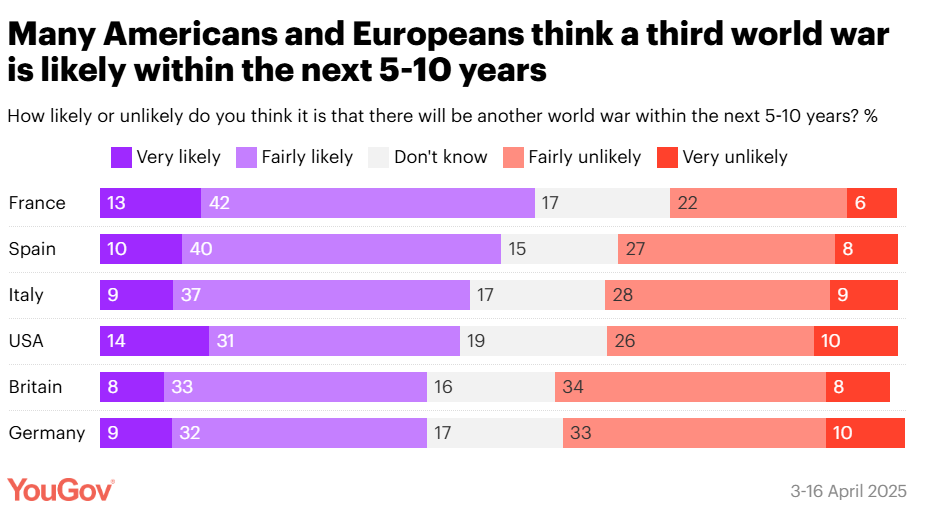Eighty years after VE-Day, which marked the formal Nazi surrender and the end of six years of war in Europe, many fear a third world war is imminent.
New YouGov polling conducted in Britain, France, Germany, Italy, Spain and the U.S. shows that between 41 per cent and 55 per cent of respondents in each country think another world war is likely to occur within the next five to 10 years. Forty-five per cent of Americans hold the same view.
According to separate Ipsos data, 82 per cent of Canadians said they strongly agreed that the world had become more dangerous in 2024, a five-point decline from the previous year.
This table shows the proportion of respondents in Europe and North America who believe a third world war could happen in the next five to 10 years.
YouGov
If another world war happens, YouGov says the majority (68 to 76 per cent) believe the conflict would involve nuclear weapons. Moreover, 57 to 73 per cent think that a third world war would result in a higher casualty count than previous global conflicts.
According to the National WWII Museum in New Orleans, the Second World War took the lives of 45 million civilians and 15 million in battle, though worldwide numbers vary.
The poll also found that 25 to 44 per cent believe that if another world war were to occur in the next 5-10 years, it would result in the deaths of most of the world’s population.
This sentiment was reflected in the Ipsos findings, with the threat of nuclear war sitting high in the minds of the global population. The research agency says 72 per cent believe there is a likelihood that nuclear, biological, or chemical warfare could happen somewhere in the world.
In addition, YouGov found that among all nations surveyed, there was a “clear sense” that most people felt their respective country’s militaries would not be sufficiently prepared to enter a war.
“Only a minority of western Europeans believe their national militaries could effectively defend their countries in the event of a third world war, ranging from a low of 16 per cent in Italy to a high of 44 per cent in France,” the survey says.
“By contrast, 71 per cent of Americans have confidence that the armed forces could defend their country,” YouGov found.
This table shows the level of confidence various countries have in their respective militaries to defend their country in conflict.
YouGov
As for the source of the threat, most European countries cite Russia as the culprit, with 72 to 82 per cent of Western Europeans telling YouGov they see the superpower as a major or moderate threat to peace in Europe. Meanwhile, 69 per cent of Americans agreed.
Since the beginning of U.S. President Donald Trump’s second term, attitudes towards Europe’s once-steadfast ally have shifted, with many now considering the country a looming threat to peace.
According to Ipsos, before Trump’s win, globally, 21 per cent said his becoming president would help increase world security, while 45 per cent said a win by former U.S. vice-president Kamala Harris would make the world more secure.
Meanwhile, Canadians were significantly more likely to think a Harris win (54 per cent) would have made the world more secure, compared to 21 per cent who said the same of a Trump victory.
These findings were also reflected in YouGov data.
“With Donald Trump making threats against Greenland, Canada and Panama, as well as his stance on Ukraine, a majority of people in Spain (58 per cent), Germany (55 per cent) and France (53 per cent) see tensions between Europe and the U.S. as a major or moderate threat to continental peace,” it says.
“Meanwhile, Americans are less likely to say so, although a third (34 per cent) still agree with their western European counterparts,” the polling continues.
Aside from the threat of a world war, Ipsos cites domestic terror attacks as a cause for concern among respondents, with 66 per cent considering terrorism a threat, followed closely by worries for personal safety and security violations, which sat at 61 per cent, and conflict between ethnic groups at 60 per cent in 2024.
YouGov sampled 1,622 adults in Great Britain, 1,081 in France, 2,381 in Germany, 1,023 in Italy, 1,051 in Spain, and 1,152 in the U.S. between April 3-16 2025.
Ipsos surveyed 22,989 adults aged 18 years and older in India, 18-74 in Canada, Malaysia, South Africa, Türkiye, and the United States, 20-74 in Thailand, 21-74 in Indonesia and Singapore, and 16-74 in all other countries between Sept. 20 and Oct. 4, 2024.

